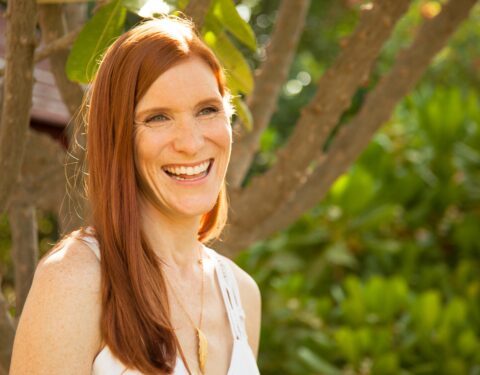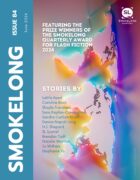First, I would like to say congratulations and that I am so grateful for the chance to interview you about your beautiful and heartbreaking piece. I would love to know what was the inspiration for “Pompeii.”
Thank you so much! It’s an absolute honor to be counted among the finalists. It’s always a little scary putting work out there, especially work that is so tender. It’s a great joy to know that this story resonated with SmokeLong.
My nine-year-old son studied volcanoes in school this year. One day he came home with a grainy photocopy of the remains that I describe in the story. It reminded me of the time, many years ago, when I saw the bodies in person, this mother curled around her child. It reminded me, too, of all the ways in which we witness tragedy: through history books, plexiglass, or through the screens of our smartphones.
I am drawn to small powerful pieces like this and I am always interested in how writers come to write something under three hundred words. Was “Pompeii” always this length or did it start longer or shorter?
It was always one sentence. This literally never happens to me, but I wrote this piece in one short sitting, almost as it is here in its final version. I wanted to capture one of those rare moments when, in the midst of our very mundane existences, we sometimes get transported somewhere very far away—and come back changed.
So much of parenting is multitasking—the damn dog food!—and while we’re juggling so many things, time is passing so quickly and suddenly we are acutely aware of that reality. Our kids are no longer who they used to be and it’s heartbreaking.
The single sentence also helped me convey the overwhelming nature of grief. All at once, this woman is grieving several things: the loss of who her son used to be; the terror and anguish that the mother and child in Pompeii must have felt in their final moments; and finally, the knowledge that the narrator’s young son had evidently absorbed much more from that experience touring Pompeii than she had ever imagined or intended.
Your use of clothes to mark the passage of time is brilliant. Why did you choose a basketball uniform for the present and the Peter Pan collar and red buttons for the past?
I guess I think of the Peter Pan collar as a symbol for that malleable age when you can dress your kids in whatever you want them to wear. The basketball uniform is more masculine, of course, but it’s also a glimpse at how this boy has changed, with his own desires about what he wants to wear and what kind of activities he wants to be involved in. As a parent, watching these small humans slowly become less and less dependent on you is bittersweet: it’s both the point—but it’s also a loss.
As someone who also lives outside of the U.S., do you find that this influences your writing in anyway?
Absolutely. I had a pretty idyllic childhood growing up in northern Minnesota. Meanwhile, my husband grew up in Lebanon during the country’s civil war. The gap in our worldviews is pretty wide, and we talk about that a lot. Now, living and raising our kids in a place that is neither his country nor mine, I find myself writing a lot about identity and what it means to belong.
It’s a privilege to get to know a part of the world that I was pretty sheltered from growing up. It’s opened my eyes and my heart in many ways. Looking back, I can’t help but see my own grief about the horrors that are happening in Gaza in this story. The images of parents cradling, grieving their dead children are incredibly heartbreaking. They fill me with a lot of despair, and I often process that through writing. In this piece in particular, I wondered, what is it like for a parent to promise a child protection against the unprotectable? Whether it’s a volcano or a white phosphorus bomb, how can I witness that both as a writer and as a mother?
Thank you so very much for your beautiful words and your insights. I would love to leave our readers with a little more about you. I noticed you have an Instagram account with your art (as well as your writing). I would love to know a little more about this aspect of your creative life.
My grandmother was a painter and some of my best childhood memories are painting with her. I love to paint, but it’s not something I let myself do for a long time—I guess because I thought I wasn’t very good. If it isn’t great, what’s the point? Moved by some I guess existential desire for “more,” I dug out her old paintbrushes a few years ago, around the time I started to lean into my writing.
I honestly feel that nurturing my creativity has made me a better person. I’m more relaxed, more balanced. Certainly more happy. I guess because I know that ultimately I’m doing it for me and not to please someone else.
I think of my grandmother often when I paint or write. I feel her nearby when I find myself trying too hard. I remember the day I showed up at her house and she was wearing white Keds with the toes cut off. They were too small, she said, laughing. She always said that a good painter knows when to stop. Trying too hard to make anything perfect almost always backfires. Why make your toes hurt when you can do something about it? It might sound silly, but forcing myself to post bits and pieces of my creative process on Instagram is a way for me to try to embrace the beautiful imperfection that my grandmother always seemed to exude.



 The SmokeLong Grand Micro Contest (The Mikey) is now an annual competition celebrating and compensating the best micro fiction and nonfiction online.
The SmokeLong Grand Micro Contest (The Mikey) is now an annual competition celebrating and compensating the best micro fiction and nonfiction online.